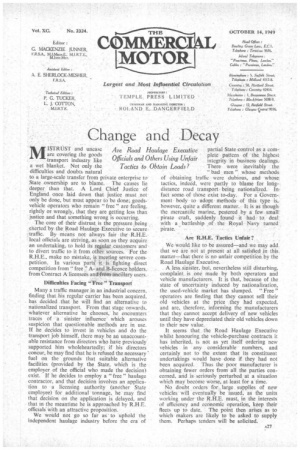Change and Decay
Page 29

If you've noticed an error in this article please click here to report it so we can fix it.
ISTRUST and unease are covering the goods transport industry like a wet blanket. Not only the difficulties and doubts natural to a large-scale transfer from private enterprise to State ownership are to blame. The causes lie deeper than that. A Lord Chief Justice of • England once laid down that justice must not only be done, but must appear to be done; goodsvehicle operators who remain " free" are feeling, rightly or wrongly, that they are getting less than justice and that something wrong is occurring.
The core of their distrust is the pressure being exerted by the Road Haulage Executive to secure traffic. By means not always fair the',R.H.E. local officials are striving, as soon as they acquire an undertaking, to hold its regular customers and to divert traffic to it from oilier sources. For the R.H.E., make no mistake, is meeting severe competition. In various parts it is fighting direct competition from " free " Aand B-licence holders, from Contract A licensees and from ancillary users.
Difficulties Facing " tcree " Transport Many a traffic manager in an industrial concern, finding that his regular carrier has been acquired, has decided that he will find an alternative to nationalized transport. From that stage onwards, whatever alternative he chooses, he encounters traces of a sinister influence which arouses suspicion that questionable methods are in use. If he decides to invest in vehicles and do the transport job himself, there may be an unaccountable resistance from directors who have previously supported him wholeheartedly; if his directors concur, he may find that he is refused the necessary• fuel on the grounds that suitable alternative facilities (provided by the State, which is the employer of the official who made the decision) exist. If he decides to employ a " free " haulage contractor, and that decision involves an application to a licensing authority (another State employee) for additional tonnage, he may find that decision on the application is delayed, and that in the meantime he is approached by R.B.E. officials with an attractive propositiOn.
We would not ea so far as ' to uphold the independent haulage industry before the era of partial Statecontrol as a complete pattern of the highest integrity in business dealings. There were inevitably the "bad men" whose methodsof obtaining traffic were dubious, and whose tactics, indeed, were partly to blame for longdistance road transportbeing nationalized. Infact some of those exist to-day. For a-Government body to adopt methodsof this type is, however, quite a different matter. It is as thoughthe mercantile marine, pestered by a few small; pirate craft, suddenly found it -had , to deal_ with a battleship of the Royal Navy turned pirate.
Are R.D.E. Tactics Unfair' We-would like to be assured—and .we may add. that we are not at present at all satisfied inthis matter—. that there is no unfair competition by the Road Haulage Executive.
A less,sinister, but, nevertheless still disturbing, complaint is one made by both operators and vehicle manufacturers. It is that, because of the state of uncertainty induced by nationalization, the used-vehicle market has slumped. " Free " operators are finding that they cannot sell their old vehicles at the price they had expected, and are, therefore, informing the manufacturers that they cannot accept delivery of new vehicles until they have depreciated their old vehicles down to their new value.
It seems that the Road Haulage Executive whilst honouring the vehicle-purchase contracts it has inherited, is not as yet itself ordering new vehicles in any considerable numbers, and certainly not to the extent that its constituent undertakings would have done if they had not been acquired. Thus the poor manufacturer is obtaining fewer orders from all the parties concerned, and is seriously perturbed at a situation which may become worse, at least for a time.
No doubt orders for large, supplies of new vehicles will eventually be issued, as the units working under the R.H.E. must, in the interests of efficiency and economic operation, keep their fleets up to date. The point then arises as to which makers are likely to be asked to supply them. Perhaps tenders will be solicited.




























































































